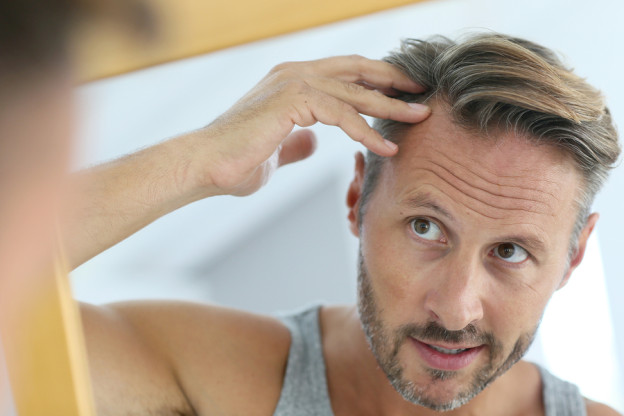By David Blyweiss, M.D., Advanced Natural Wellness
January 27, 2020
There’s a butterfly-shaped gland in your neck I’ll bet you never think about…
But just like your heart, lungs, liver and other organs, it’s something you should be taking good care of.
This little gland – the thyroid – pretty much rules your body. And when it slows down, so does everything else.
Your metabolism flies out the window… right along with your ability to burn calories. Your memory, libido and energy levels might take a holiday and it’s not unusual to feel fatigued, depressed and listless. And finally an under-active thyroid may make it difficult to sleep at night.
Now, it’s easy to put all of these symptoms off to aging. But there’s one more thing that frequently starts to disappear when thyroid problems set in. And, it’s one that often sends many of my patients — especially women — into a panic.
It’s something that may have happened to you… hair loss.
Open your arteries, improve blood flow for a new health miracle...
Did you know your circulatory system has over 60,000 miles of arteries, veins and other blood vessels, if stretched end to end?
But as you age, your blood vessels undergo changes, which may cause them to stiffen, thicken and get clogged.
GOOD NEWS! Doctors have now identified a “Miracle Molecule” inside your arteries that helps OPEN your arteries and IMPROVE blood flow.
It’s what Dr. Valentin Fuster calls it, "One of the most important discoveries in the history of cardiovascular medicine."To you, that means...
- Healthy blood pressure
- Sharper mind and memory
- Skyrocketing energy and muscular strength
- Increased pleasure and passion in the bedroom
- Improved circulation to every cell and organ in your body
Go here to discover a new natural way to significantly boost the levels of this miracle molecule in YOUR body NOW!
Is Your Hair Loss Thyroid Related?
Now, first off, it’s natural to lose up to 100 hairs a day. You may see evidence of this backing up your shower drain every morning.
And one of the most common causes of hair loss is inflammation. Stress narrows the capillaries and blood flow to your scalp so you lose some hair.
But even with that in mind, it can be startling to look in the mirror one day and notice your scalp shining back at you.
If this happens to you – and if you’re experiencing some of the symptoms I mentioned above – it could be a big red flag that you have an underactive thyroid.
This is especially common in women. But even if you’re a man, it doesn’t mean you’re immune.
Now, here’s the problem. More than half of the 20 million Americans who have thyroid issues don’t even know it… even if their doctor has checked for it.
Are You Suffering From...
- Love handles and a pot belly
- Romance that isn't what it used to
- Forgetfulness and inattention
- Low (or no) strength and endurance
- A sex drive that's shifted into neutral...or worse
If so...you may have Mature Male Burnout. Click here to discover more about this unique condition and what you can do about it.
That’s because the test most often used to check your thyroid doesn’t paint the whole picture. Tests often just look for TSH, or thyroid stimulating hormone.
The problem is, TSH isn’t actually a thyroid hormone. It comes from the pituitary gland, and its job is to alert the thyroid to produce thyroid hormones.
So, this isn’t an adequate measure when it comes to thyroid testing.
Instead, what you need is a full thyroid panel. This includes testing T3, T4 and TPO (not just TSH). A reverse T3 (rT3) test can also solve a few mysteries if you think you may have a thyroid problem.
Now, standard thyroid treatments include drugs like Synthroid and Armour… but there’s a problem with them. Many people taking these drugs experience even further hair loss.
And that’s the last thing you want!
This makes it especially important to take steps to naturally restore thyroid function. This, in turn, will lead to normal hair growth.
The Driving Force Behind Hypothyroidism
Iodine is the most important mineral involved in making thyroid hormone. But today, there are many environmental factors that knock the iodine right out of you.
You see, certain compounds compete with iodine receptors. When you’re exposed to these compounds, they displace the iodine. Your body just can’t hold onto it.
Some of these culprits include:
- The fluoride in your toothpaste, mouthwash, Teflon pans, fluorinated medications and public water supply. Tip: Opt for non-fluoride dental products; drink spring water.
- Chloride, which is also found in your public water system… and any pool you swim in. Tip: Add a filter to your tap water; find natural alternatives to clean your pool.
- Bromine – an additive found in many citrus-flavored drinks, baked goods and non-organic produce (especially strawberries).
The best way to get a handle on your iodine levels is to have your doctor take a test that measures how much iodine is excreted in your urine. If you’re low, I recommend supplementing with 6.25 mg of iodine daily, then retest as below.
There’s also a simple trick you can use to test levels at home. It’s not quite as accurate, but it can be useful.
Before bedtime, swab about a 3 inch square of iodine tincture (the orange kind) onto the inside of your thigh, inner forearm or your abdomen and allow it to dry. Monitor the color over the next 24 hours. The faster the color disappears, the more likely it is you have a deficiency.
Getting a solid diagnosis is important. But in the meantime, there are still plenty of steps you can take strengthen your thyroid and get your hair growing again.
Here’s the protocol I recommend to my patients …
- Iodine 6.25 mg daily (if levels are low)
- Tyrosine 500 mg daily
- Zinc 25 mg daily
- Copper 1-2 mg daily (there is a generally accepted 15-to-1 zinc-to-copper ratio needed)
- Selenium 100 mcg daily
- Vitamin B6 50 mg daily
- Retest your full thyroid panel in three months
SOURCES:
Drutel A, et al. Selenium and the thyroid gland: more good news for clinicians. Clin Endocrinol (Oxf). 2013 Feb;78(2):155-64.
Ertek S, et al. Relationship between serum zinc levels, thyroid hormones and thyroid volume following successful iodine supplementation. Hormones (Athens). 2010 Jul-Sep;9(3):263-8.






